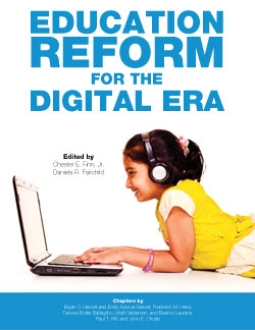Will the digital-learning movement repeat the mistakes of the charter-school movement? How much more successful might today's charter universe look if yesterday's proponents had focused on the policies and practices needed to ensure its quality, freedom, and resources over the long term? What mistakes might have been avoided? Damaging scandals forestalled? Missed opportunities seized?
Can we be smarter about taking high-quality online and blended schools to scale—and to educational success? Yes, says this volume, as it addresses such thorny policy issues as quality control, staffing, funding, and governance for the digital sector. In these pages, the authors show how current arrangements need to change—often radically—if instructional technology is to realize its potential.
Table of Contents
Introduction, by Chester E. Finn, Jr. and Daniela Fairchild
Chapter One: "Teachers in the Age of Digital Instruction," by Bryan C. Hassel and Emily Ayscue Hassel
Chapter Two: "Quality Control in K-12 Digital Learning: Three (Imperfect) Solutions," by Frederick M. Hess
Chapter Three: "The Costs of Online Learning," Tamara Butler Battaglino, Matt Haldeman, and Eleanor Laurans
Chapter Four: "School Finance in the Digital-Learning Era," by Paul T. Hill
Chapter Five: "Overcoming the Governance Challenge in K-12 Online Learning," by John E. Chubb




